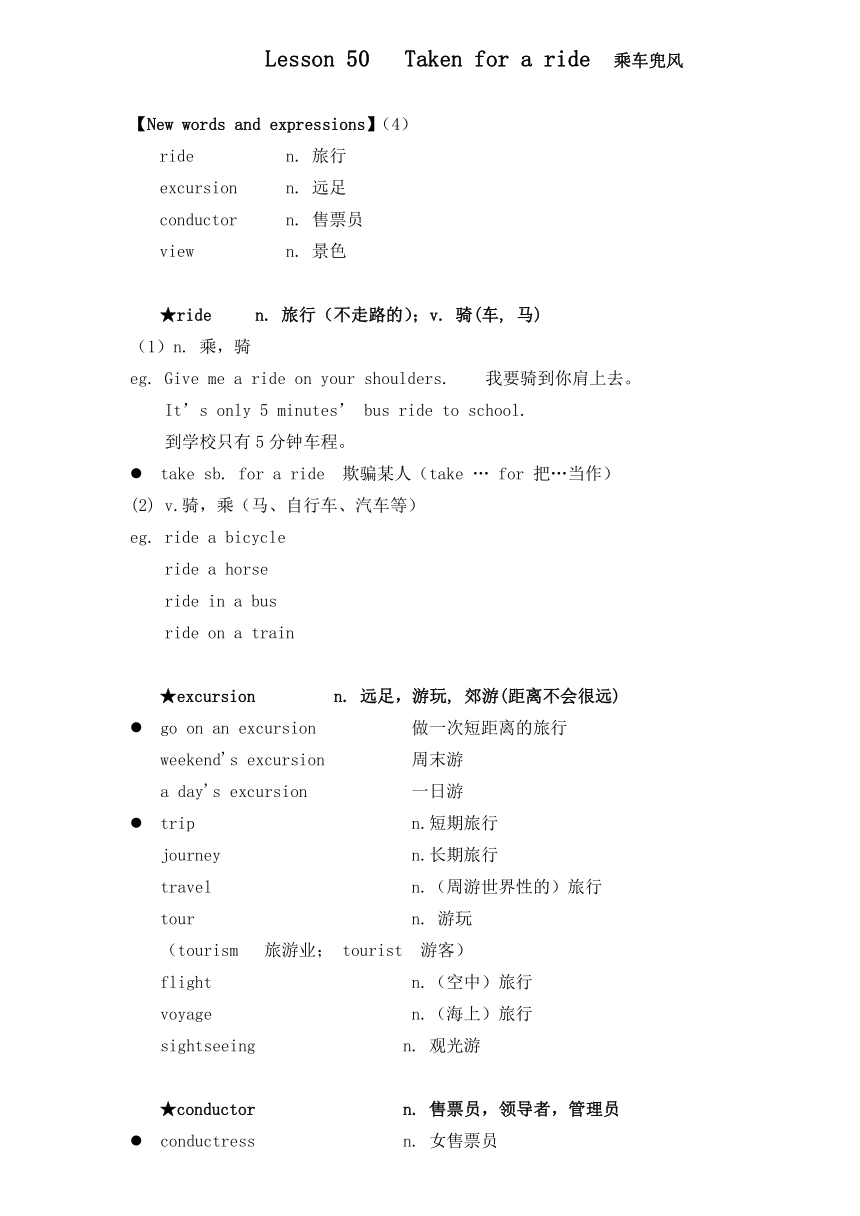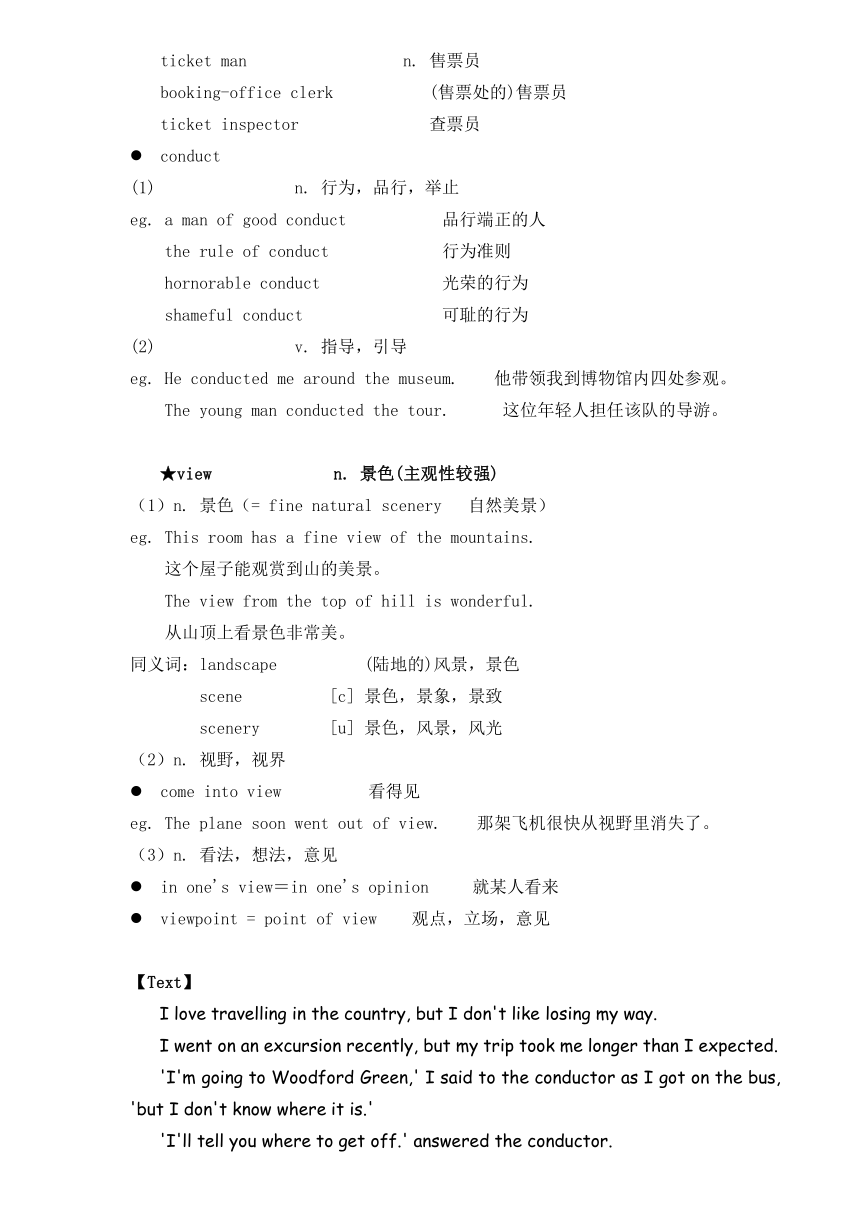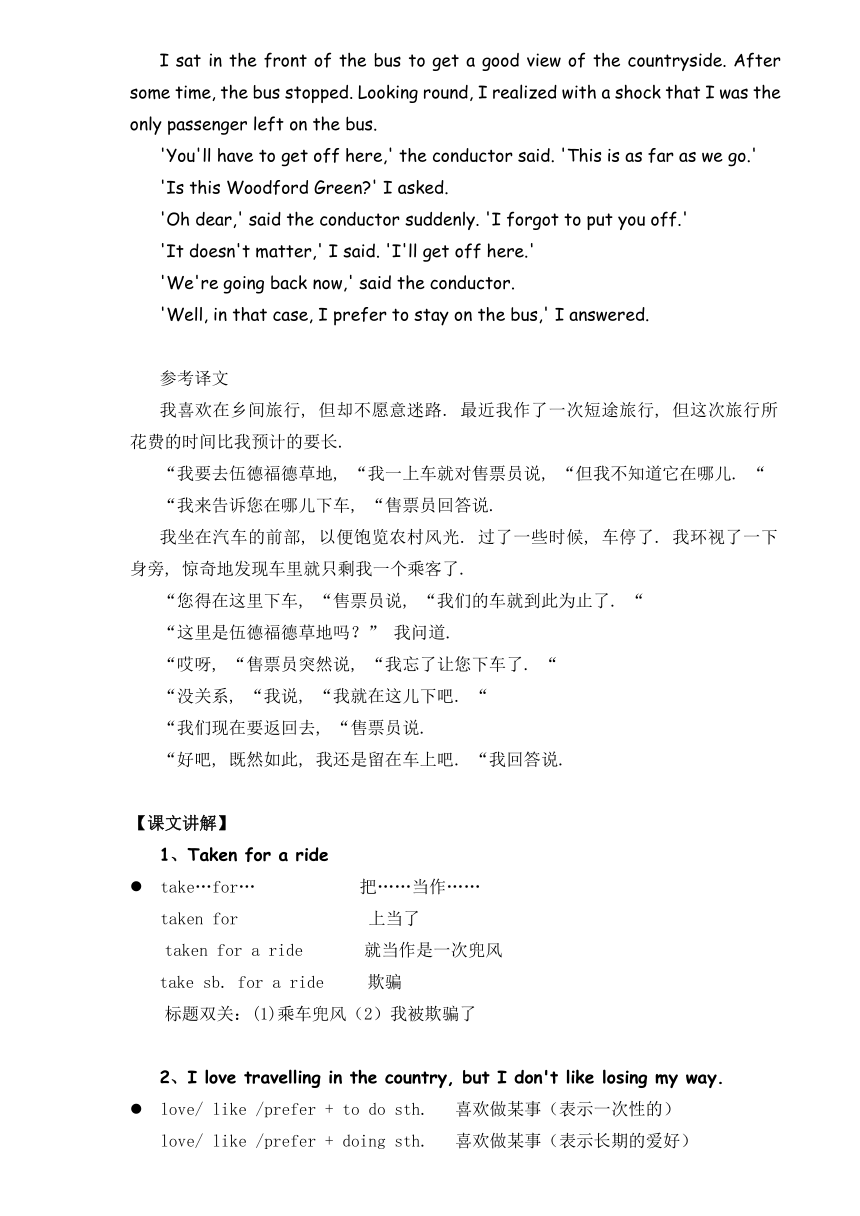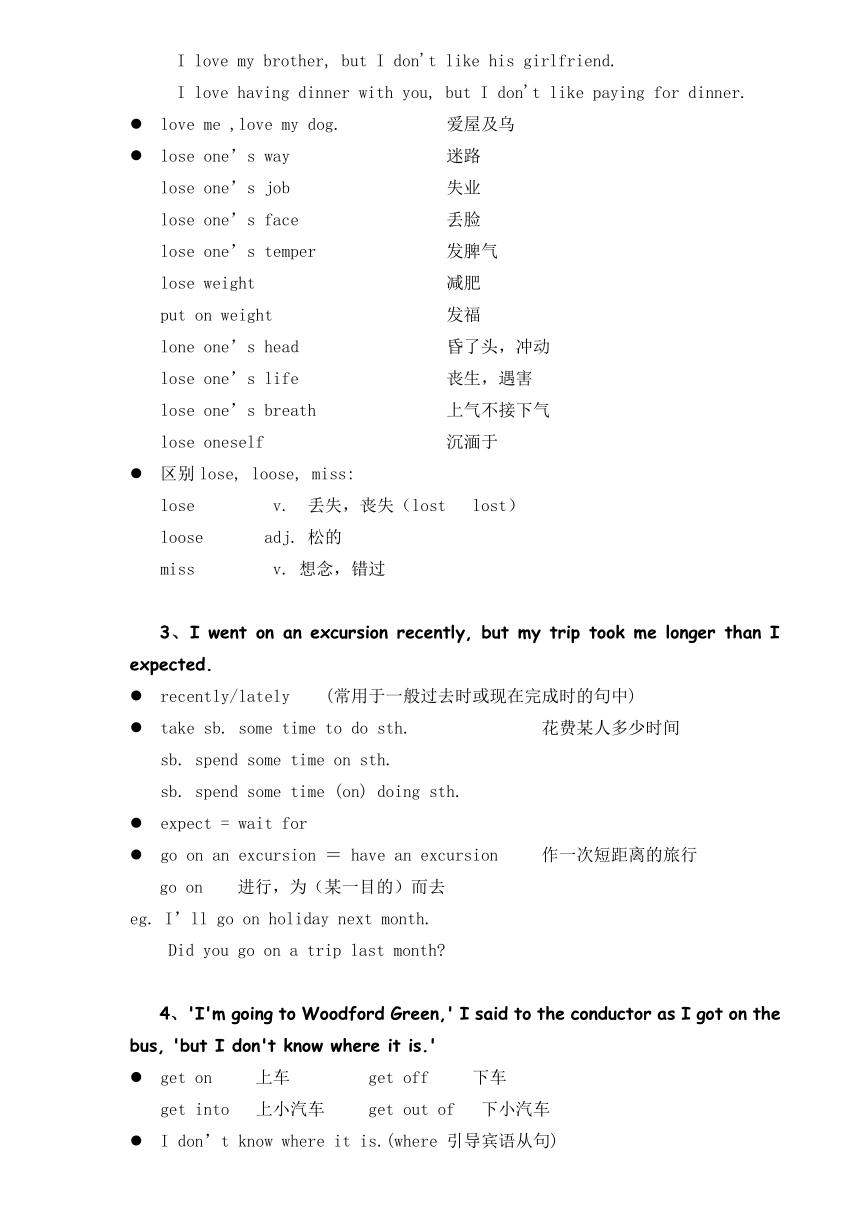新概念英语第二册笔记 Lesson 50 Taken for a ride 乘车兜风
文档属性
| 名称 | 新概念英语第二册笔记 Lesson 50 Taken for a ride 乘车兜风 |  | |
| 格式 | docx | ||
| 文件大小 | 31.5KB | ||
| 资源类型 | 教案 | ||
| 版本资源 | 新概念英语 | ||
| 科目 | 英语 | ||
| 更新时间 | 2023-09-26 06:34:52 | ||
图片预览




文档简介
Lesson 50 Taken for a ride 乘车兜风
【New words and expressions】(4)
ride n. 旅行
excursion n. 远足
conductor n. 售票员
view n. 景色
★ride n. 旅行(不走路的);v. 骑(车, 马)
(1)n. 乘,骑
eg. Give me a ride on your shoulders. 我要骑到你肩上去。
It’s only 5 minutes’ bus ride to school.
到学校只有5分钟车程。
take sb. for a ride 欺骗某人(take … for 把…当作)
(2) v.骑,乘(马、自行车、汽车等)
eg. ride a bicycle
ride a horse
ride in a bus
ride on a train
★excursion n. 远足,游玩, 郊游(距离不会很远)
go on an excursion 做一次短距离的旅行
weekend's excursion 周末游
a day's excursion 一日游
trip n.短期旅行
journey n.长期旅行
travel n.(周游世界性的)旅行
tour n. 游玩
(tourism 旅游业; tourist 游客)
flight n.(空中)旅行
voyage n.(海上)旅行
sightseeing n. 观光游
★conductor n. 售票员,领导者,管理员
conductress n. 女售票员
ticket man n. 售票员
booking-office clerk (售票处的)售票员
ticket inspector 查票员
conduct
n. 行为,品行,举止
eg. a man of good conduct 品行端正的人
the rule of conduct 行为准则
hornorable conduct 光荣的行为
shameful conduct 可耻的行为
v. 指导,引导
eg. He conducted me around the museum. 他带领我到博物馆内四处参观。
The young man conducted the tour. 这位年轻人担任该队的导游。
★view n. 景色(主观性较强)
(1)n. 景色(= fine natural scenery 自然美景)
eg. This room has a fine view of the mountains.
这个屋子能观赏到山的美景。
The view from the top of hill is wonderful.
从山顶上看景色非常美。
同义词:landscape (陆地的)风景,景色
scene [c] 景色,景象,景致
scenery [u] 景色,风景,风光
(2)n. 视野,视界
come into view 看得见
eg. The plane soon went out of view. 那架飞机很快从视野里消失了。
(3)n. 看法,想法,意见
in one's view=in one's opinion 就某人看来
viewpoint = point of view 观点,立场,意见
【Text】
I love travelling in the country, but I don't like losing my way.
I went on an excursion recently, but my trip took me longer than I expected.
'I'm going to Woodford Green,' I said to the conductor as I got on the bus, 'but I don't know where it is.'
'I'll tell you where to get off.' answered the conductor.
I sat in the front of the bus to get a good view of the countryside. After some time, the bus stopped. Looking round, I realized with a shock that I was the only passenger left on the bus.
'You'll have to get off here,' the conductor said. 'This is as far as we go.'
'Is this Woodford Green ' I asked.
'Oh dear,' said the conductor suddenly. 'I forgot to put you off.'
'It doesn't matter,' I said. 'I'll get off here.'
'We're going back now,' said the conductor.
'Well, in that case, I prefer to stay on the bus,' I answered.
参考译文
我喜欢在乡间旅行, 但却不愿意迷路. 最近我作了一次短途旅行, 但这次旅行所花费的时间比我预计的要长.
“我要去伍德福德草地, “我一上车就对售票员说, “但我不知道它在哪儿. “
“我来告诉您在哪儿下车, “售票员回答说.
我坐在汽车的前部, 以便饱览农村风光. 过了一些时候, 车停了. 我环视了一下身旁, 惊奇地发现车里就只剩我一个乘客了.
“您得在这里下车, “售票员说, “我们的车就到此为止了. “
“这里是伍德福德草地吗?” 我问道.
“哎呀, “售票员突然说, “我忘了让您下车了. “
“没关系, “我说, “我就在这儿下吧. “
“我们现在要返回去, “售票员说.
“好吧, 既然如此, 我还是留在车上吧. “我回答说.
【课文讲解】
1、Taken for a ride
take…for… 把……当作……
taken for 上当了
taken for a ride 就当作是一次兜风
take sb. for a ride 欺骗
标题双关:(1)乘车兜风(2)我被欺骗了
2、I love travelling in the country, but I don't like losing my way.
love/ like /prefer + to do sth. 喜欢做某事(表示一次性的)
love/ like /prefer + doing sth. 喜欢做某事(表示长期的爱好)
I love my brother, but I don't like his girlfriend.
I love having dinner with you, but I don't like paying for dinner.
love me ,love my dog. 爱屋及乌
lose one’s way 迷路
lose one’s job 失业
lose one’s face 丢脸
lose one’s temper 发脾气
lose weight 减肥
put on weight 发福
lone one’s head 昏了头,冲动
lose one’s life 丧生,遇害
lose one’s breath 上气不接下气
lose oneself 沉湎于
区别lose, loose, miss:
lose v. 丢失,丧失(lost lost)
loose adj. 松的
miss v. 想念,错过
3、I went on an excursion recently, but my trip took me longer than I expected.
recently/lately (常用于一般过去时或现在完成时的句中)
take sb. some time to do sth. 花费某人多少时间
sb. spend some time on sth.
sb. spend some time (on) doing sth.
expect = wait for
go on an excursion = have an excursion 作一次短距离的旅行
go on 进行,为(某一目的)而去
eg. I’ll go on holiday next month.
Did you go on a trip last month
4、'I'm going to Woodford Green,' I said to the conductor as I got on the bus, 'but I don't know where it is.'
get on 上车 get off 下车
get into 上小汽车 get out of 下小汽车
I don’t know where it is.(where 引导宾语从句)
I’ll tell you where to get off.(特殊疑问词where + 不定式作宾语)
5、I sat in the front of the bus to get a good view of the countryside.
to get a good view of the countryside (不定式做目的状语)
in the front of 在…前部(同一个整体)
in front of 在…前面(不同的整体)
get a good view of 观赏…的美景
country (1) 国家[c] (2) 农村[u]
countryside 乡村,暗含偏僻之意
rural area 农村
urban area 市区
suburban area 郊区
6、After some time, the bus stopped. Looking round, I realized with a shock that I was the only passenger left on the bus.
looking round 现在分词短语作伴随状语
realize 意识到
that I was the only passenger left on the bus宾语从句
非谓语动词(现在分词或过去分词)做状语, 这个动作必然与主句主语有关:-ing与主句主语构成主动关系;-ed 与主句主语构成被动关系;to do与主句主语构成目的关系。如果非谓语动词做定语, 只与被修饰词相关, 与主语无关
passing plain 路过的飞机; ploughed field 耕过的地
如果-ing/-ed做宾补, 与宾语有关
I find the door locked. (locked被动,门被锁)
with+ n. 表示状态
I do sth with an excitement.
left放在被修饰词之后
on the bus = in the bus 在火车上、汽车上既可以用“in”又可用“on”
7、'You'll have to get off here,' the conductor said. 'This is as far as we go.'
as far as = so far as 到……程度/限度,就……的限度而言
= we couldn't go any more
否定句用so far as
eg. walk as far as the foot of a mountain 走到山脚那么远
as far as eye can reach 就视力所及
as far as I know 就我所知
as far as I concerned 就我而言
8、'Is this Woodford Green ' I asked. 'Oh dear,' said the conductor suddenly. 'I forgot to put you off.'
oh dear 哦, 天呐
put sb. off 让某人下车(飞行、船等)
put sb. off 提醒(某人)……
= remind sb. to do sth.
put sb. off 推脱, 敷衍
put sth.off 延期,拖延(与人)见面时间
put off the meeting 将会议延期
forget to do sth. 忘记去做某事
forget doing sth. 忘记做过某事
9、'It doesn't matter,' I said. 'I'll get off here.' 'We're going back now,' said the conductor.
It doesn’t matter. = That’s all right. 没关系
10、''Well, in that case, I prefer to stay on the bus,' I answered.
case n. 情况
in that case 若是那样
9、'Oh dear,' said the conductor suddenly. 'I forgot to put you off.'
10、'Well, in that case, I prefer to stay on the bus,' I answered.
in that(this) case 如果那样(这样)的话,既然是那样(这样)
prefer to do sth. 宁可做某事
prefer to do…rather than… 宁可……也不……
【Key structures】
表示习惯性动作
一般现在时
表习惯性动作的动词:
belong to 属于
consist of 由…组成
contain 含有,容纳
desire 要求
detest 痛恨
like 喜欢
dislike 不喜欢
hope 希望
love 爱
matter 有关系
mean 打算
mind 介意
need 需要
want 想要
wish 希望
believe 相信
doubt 怀疑
see 看见
hear 听见
know 知道
understand 理解,懂得
think 认为
consider 认为
feel 觉得
look 看起来
seem 看上去
show 显示
have 有
sound 听起来
taste 尝起来
require 要求
possess 拥有
care 关心
【Special Difficulties】
Lose, Loose, Miss.
lose vt. 失去,丧失,遗失,丢失
Roy has lost his job again.
She lost her parents when she was sixteen.
If you bet on that horse you will lose your money. (bet on sth 就……打赌)
loose adj. 松动的,松的,松开的
Servral screws have come loose. (come loose,松了(系动词+adj.))
The handle of this suitcase is very / has come loose.
miss v. 怀念, 思念, 错过,未能……,缺(课等),惦念,想念
Hurry or you’ll miss the train.
I missed my English lesson.
missing adj. 不见了的
sth. is lost = sth. is missing
missing boy 失踪了的孩子(不能用 “lost” )
Expect, Wait for
expect可以表示“预计……可能发生(或来到),等待,期盼”,它表示等待时往往侧重人的心理而不是具体在某个地方等。
I expect / I’m expecting to hear from you.
I’m expecting the bus to arrive in the next ten minutes.
My trip took me longer than I expected.
wait for主要指“等待”这个动作本身。
I’m waiting for the next bus.
【New words and expressions】(4)
ride n. 旅行
excursion n. 远足
conductor n. 售票员
view n. 景色
★ride n. 旅行(不走路的);v. 骑(车, 马)
(1)n. 乘,骑
eg. Give me a ride on your shoulders. 我要骑到你肩上去。
It’s only 5 minutes’ bus ride to school.
到学校只有5分钟车程。
take sb. for a ride 欺骗某人(take … for 把…当作)
(2) v.骑,乘(马、自行车、汽车等)
eg. ride a bicycle
ride a horse
ride in a bus
ride on a train
★excursion n. 远足,游玩, 郊游(距离不会很远)
go on an excursion 做一次短距离的旅行
weekend's excursion 周末游
a day's excursion 一日游
trip n.短期旅行
journey n.长期旅行
travel n.(周游世界性的)旅行
tour n. 游玩
(tourism 旅游业; tourist 游客)
flight n.(空中)旅行
voyage n.(海上)旅行
sightseeing n. 观光游
★conductor n. 售票员,领导者,管理员
conductress n. 女售票员
ticket man n. 售票员
booking-office clerk (售票处的)售票员
ticket inspector 查票员
conduct
n. 行为,品行,举止
eg. a man of good conduct 品行端正的人
the rule of conduct 行为准则
hornorable conduct 光荣的行为
shameful conduct 可耻的行为
v. 指导,引导
eg. He conducted me around the museum. 他带领我到博物馆内四处参观。
The young man conducted the tour. 这位年轻人担任该队的导游。
★view n. 景色(主观性较强)
(1)n. 景色(= fine natural scenery 自然美景)
eg. This room has a fine view of the mountains.
这个屋子能观赏到山的美景。
The view from the top of hill is wonderful.
从山顶上看景色非常美。
同义词:landscape (陆地的)风景,景色
scene [c] 景色,景象,景致
scenery [u] 景色,风景,风光
(2)n. 视野,视界
come into view 看得见
eg. The plane soon went out of view. 那架飞机很快从视野里消失了。
(3)n. 看法,想法,意见
in one's view=in one's opinion 就某人看来
viewpoint = point of view 观点,立场,意见
【Text】
I love travelling in the country, but I don't like losing my way.
I went on an excursion recently, but my trip took me longer than I expected.
'I'm going to Woodford Green,' I said to the conductor as I got on the bus, 'but I don't know where it is.'
'I'll tell you where to get off.' answered the conductor.
I sat in the front of the bus to get a good view of the countryside. After some time, the bus stopped. Looking round, I realized with a shock that I was the only passenger left on the bus.
'You'll have to get off here,' the conductor said. 'This is as far as we go.'
'Is this Woodford Green ' I asked.
'Oh dear,' said the conductor suddenly. 'I forgot to put you off.'
'It doesn't matter,' I said. 'I'll get off here.'
'We're going back now,' said the conductor.
'Well, in that case, I prefer to stay on the bus,' I answered.
参考译文
我喜欢在乡间旅行, 但却不愿意迷路. 最近我作了一次短途旅行, 但这次旅行所花费的时间比我预计的要长.
“我要去伍德福德草地, “我一上车就对售票员说, “但我不知道它在哪儿. “
“我来告诉您在哪儿下车, “售票员回答说.
我坐在汽车的前部, 以便饱览农村风光. 过了一些时候, 车停了. 我环视了一下身旁, 惊奇地发现车里就只剩我一个乘客了.
“您得在这里下车, “售票员说, “我们的车就到此为止了. “
“这里是伍德福德草地吗?” 我问道.
“哎呀, “售票员突然说, “我忘了让您下车了. “
“没关系, “我说, “我就在这儿下吧. “
“我们现在要返回去, “售票员说.
“好吧, 既然如此, 我还是留在车上吧. “我回答说.
【课文讲解】
1、Taken for a ride
take…for… 把……当作……
taken for 上当了
taken for a ride 就当作是一次兜风
take sb. for a ride 欺骗
标题双关:(1)乘车兜风(2)我被欺骗了
2、I love travelling in the country, but I don't like losing my way.
love/ like /prefer + to do sth. 喜欢做某事(表示一次性的)
love/ like /prefer + doing sth. 喜欢做某事(表示长期的爱好)
I love my brother, but I don't like his girlfriend.
I love having dinner with you, but I don't like paying for dinner.
love me ,love my dog. 爱屋及乌
lose one’s way 迷路
lose one’s job 失业
lose one’s face 丢脸
lose one’s temper 发脾气
lose weight 减肥
put on weight 发福
lone one’s head 昏了头,冲动
lose one’s life 丧生,遇害
lose one’s breath 上气不接下气
lose oneself 沉湎于
区别lose, loose, miss:
lose v. 丢失,丧失(lost lost)
loose adj. 松的
miss v. 想念,错过
3、I went on an excursion recently, but my trip took me longer than I expected.
recently/lately (常用于一般过去时或现在完成时的句中)
take sb. some time to do sth. 花费某人多少时间
sb. spend some time on sth.
sb. spend some time (on) doing sth.
expect = wait for
go on an excursion = have an excursion 作一次短距离的旅行
go on 进行,为(某一目的)而去
eg. I’ll go on holiday next month.
Did you go on a trip last month
4、'I'm going to Woodford Green,' I said to the conductor as I got on the bus, 'but I don't know where it is.'
get on 上车 get off 下车
get into 上小汽车 get out of 下小汽车
I don’t know where it is.(where 引导宾语从句)
I’ll tell you where to get off.(特殊疑问词where + 不定式作宾语)
5、I sat in the front of the bus to get a good view of the countryside.
to get a good view of the countryside (不定式做目的状语)
in the front of 在…前部(同一个整体)
in front of 在…前面(不同的整体)
get a good view of 观赏…的美景
country (1) 国家[c] (2) 农村[u]
countryside 乡村,暗含偏僻之意
rural area 农村
urban area 市区
suburban area 郊区
6、After some time, the bus stopped. Looking round, I realized with a shock that I was the only passenger left on the bus.
looking round 现在分词短语作伴随状语
realize 意识到
that I was the only passenger left on the bus宾语从句
非谓语动词(现在分词或过去分词)做状语, 这个动作必然与主句主语有关:-ing与主句主语构成主动关系;-ed 与主句主语构成被动关系;to do与主句主语构成目的关系。如果非谓语动词做定语, 只与被修饰词相关, 与主语无关
passing plain 路过的飞机; ploughed field 耕过的地
如果-ing/-ed做宾补, 与宾语有关
I find the door locked. (locked被动,门被锁)
with+ n. 表示状态
I do sth with an excitement.
left放在被修饰词之后
on the bus = in the bus 在火车上、汽车上既可以用“in”又可用“on”
7、'You'll have to get off here,' the conductor said. 'This is as far as we go.'
as far as = so far as 到……程度/限度,就……的限度而言
= we couldn't go any more
否定句用so far as
eg. walk as far as the foot of a mountain 走到山脚那么远
as far as eye can reach 就视力所及
as far as I know 就我所知
as far as I concerned 就我而言
8、'Is this Woodford Green ' I asked. 'Oh dear,' said the conductor suddenly. 'I forgot to put you off.'
oh dear 哦, 天呐
put sb. off 让某人下车(飞行、船等)
put sb. off 提醒(某人)……
= remind sb. to do sth.
put sb. off 推脱, 敷衍
put sth.off 延期,拖延(与人)见面时间
put off the meeting 将会议延期
forget to do sth. 忘记去做某事
forget doing sth. 忘记做过某事
9、'It doesn't matter,' I said. 'I'll get off here.' 'We're going back now,' said the conductor.
It doesn’t matter. = That’s all right. 没关系
10、''Well, in that case, I prefer to stay on the bus,' I answered.
case n. 情况
in that case 若是那样
9、'Oh dear,' said the conductor suddenly. 'I forgot to put you off.'
10、'Well, in that case, I prefer to stay on the bus,' I answered.
in that(this) case 如果那样(这样)的话,既然是那样(这样)
prefer to do sth. 宁可做某事
prefer to do…rather than… 宁可……也不……
【Key structures】
表示习惯性动作
一般现在时
表习惯性动作的动词:
belong to 属于
consist of 由…组成
contain 含有,容纳
desire 要求
detest 痛恨
like 喜欢
dislike 不喜欢
hope 希望
love 爱
matter 有关系
mean 打算
mind 介意
need 需要
want 想要
wish 希望
believe 相信
doubt 怀疑
see 看见
hear 听见
know 知道
understand 理解,懂得
think 认为
consider 认为
feel 觉得
look 看起来
seem 看上去
show 显示
have 有
sound 听起来
taste 尝起来
require 要求
possess 拥有
care 关心
【Special Difficulties】
Lose, Loose, Miss.
lose vt. 失去,丧失,遗失,丢失
Roy has lost his job again.
She lost her parents when she was sixteen.
If you bet on that horse you will lose your money. (bet on sth 就……打赌)
loose adj. 松动的,松的,松开的
Servral screws have come loose. (come loose,松了(系动词+adj.))
The handle of this suitcase is very / has come loose.
miss v. 怀念, 思念, 错过,未能……,缺(课等),惦念,想念
Hurry or you’ll miss the train.
I missed my English lesson.
missing adj. 不见了的
sth. is lost = sth. is missing
missing boy 失踪了的孩子(不能用 “lost” )
Expect, Wait for
expect可以表示“预计……可能发生(或来到),等待,期盼”,它表示等待时往往侧重人的心理而不是具体在某个地方等。
I expect / I’m expecting to hear from you.
I’m expecting the bus to arrive in the next ten minutes.
My trip took me longer than I expected.
wait for主要指“等待”这个动作本身。
I’m waiting for the next bus.
同课章节目录
